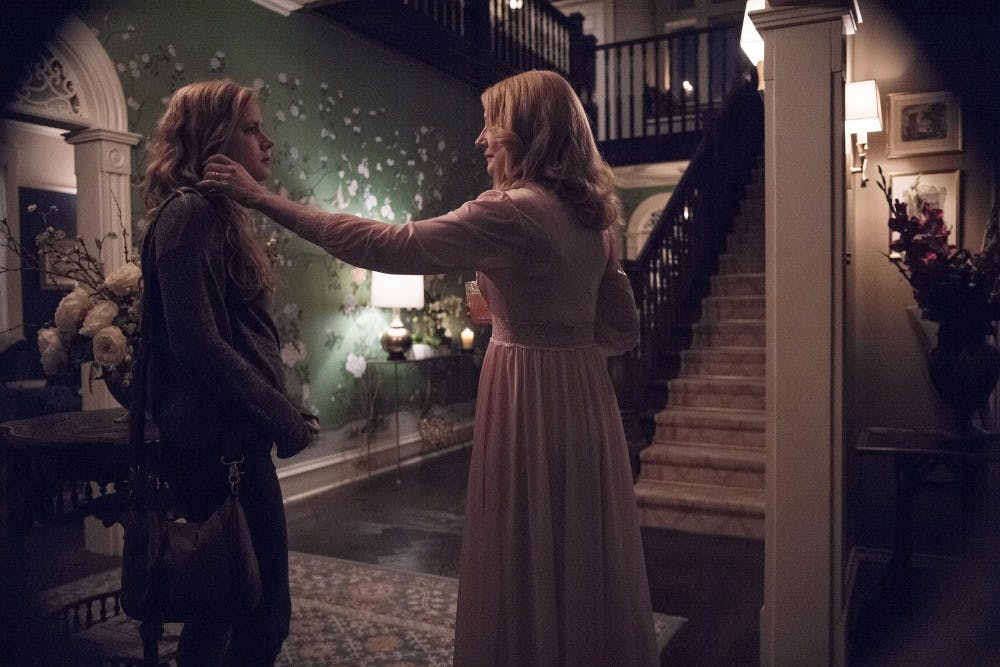This article contains spoilers for HBO’s limited series “Sharp Objects.”
“Sharp Objects,” the latest HBO limited series based on an adaptation of Gone Girl author Gillian Flynn’s debut novel, ended last weekend in a stomach–churning twist. Starring power trio Amy Adams as Camille Preaker, Patricia Clarkson as her mother Adora, and Eliza Scanlen as her stepsister Amma, the story is both a murder mystery and a character study with the twisted subversion of traditional female roles that is Flynn’s trademark in her other books. But while the oppressive Southern heat melts the small town of Wind Gap, Missouri to its rotten core, the rich diegetic music reveals more about the story’s characters than any of their endless drunk–on–mint–julep confessions.
Music leaks into the plot from every corner. Adams’ character Camille Preaker drowns in Led Zeppelin songs while driving around her hometown in a drunken haze. Her creepily passive stepdad Alan, plays the beautiful classical piano of Alexandra Streliski out of an unimaginably expensive stereo system. Amma herself, who is arguably the most captivating character of the series, has a deeply varied music taste, from Engelbert Humperdinck to 2Pac.
The director of the series, Jean–Marc Vallée (Dallas Buyers Club, Big Little Lies), has a reputation for letting music become its own character. With the help of series’ music supervisor Susan Jacobs, Vallée drenches the sluggish landscape in a haze as deep as that of Camille’s trauma–induced alcoholism. Paired with seamless, rapid-fire splicing of memories past and present, every scene becomes utterly hypnotic—so much so that we almost forget about a potential serial killer that’s still on the loose.
So present is some form of music for almost every character that it reflects the interweaving codependent relationships among them. Alan remains devoted to Adora, despite her icy rejections of physical intimacy with him and his own suspicions that she may be involved with the Wind Gap Police Chief Vickery. On his subdued days, he escapes into older jazz and blues (with racy LP covers). But in a near fit of rage, The Doors’ “Riders in the Storm,” blasts in the background.
Camille, too, uses the angst of mid–twentieth century rock to dilute frustrations—though they stem from her past more than anything else. She may have escaped her hometown, but the scratched words of pain and shame in her skin show she’s far from forgotten the hold it has on her. Led Zeppelin’s “In the Evening” is her opiate of choice, second only to the ever-present bottle of clear liquid that’s anything but water in her hand. Still, she weaves in rebellious music from this century as well, most notably playing Hurray for the Riff Raff’s “Pa’Lante” in an angry car ride home from the town’s annual Civil War (read: Confederate soldiers) celebration.
But while the music subtly adds to the character development, it usually stays in the background without really factoring into the plotline. It’s not until the final few seconds that the murderess comes clean, and the songs trailing behind her come together in an aha moment of horror. After the penultimate episode reveals that Adora was responsible for the death of her young daughter Marian decades ago due to her Munchausen’s by proxy disorder, we were all busy piecing together who might be her accomplice in the two more recent murders of other young girls. Too busy to notice who now sits at the other end of her caretaker addiction.
“Mama’s Gonna Give You Love,” by Emily Wells, “I Love My Mama,” by Snoop Dogg, “Dear Mama,” by 2Pac: these are the songs that follow Amma. Paired with the ringing devotion in the Led Zeppelin lyrics, the whole Crellin family reeks of addiction, whether it be to music, to alcohol, or to love—in this case, a murderous one. And by the final sentence of the movie, it’s not so hard to understand the motive of Amma’s violence if we listen to Robert Plant’s crooning voice one more time: “She don’t show no pity, baby / She don’t make no rules / Oh, I need your love."







